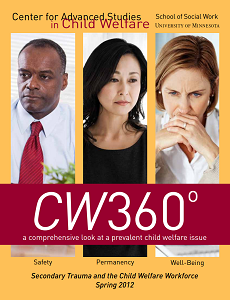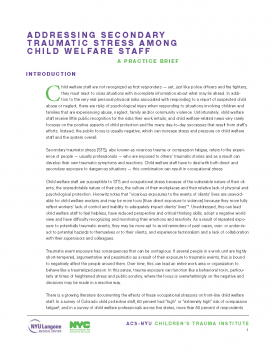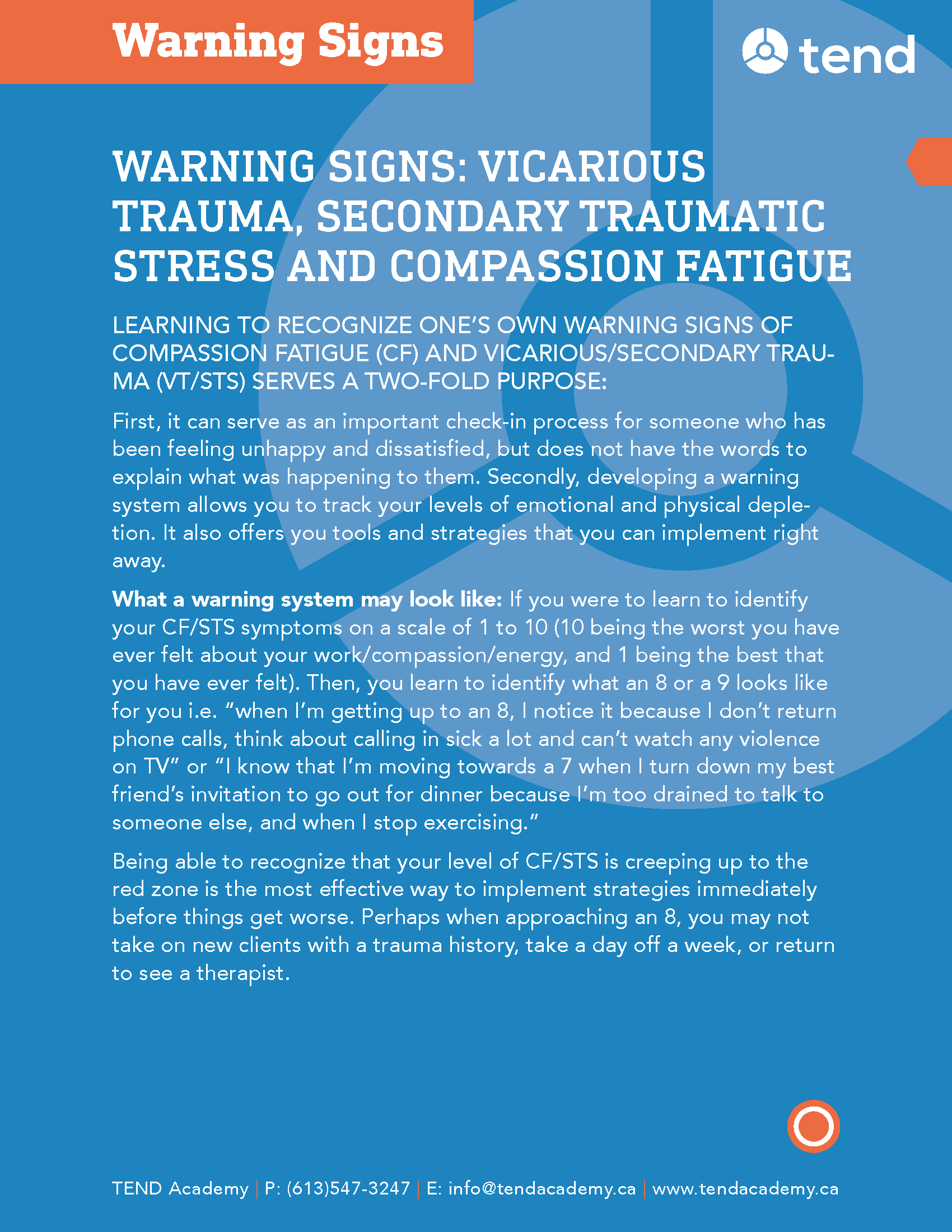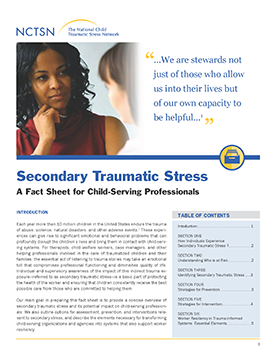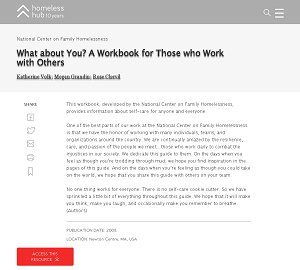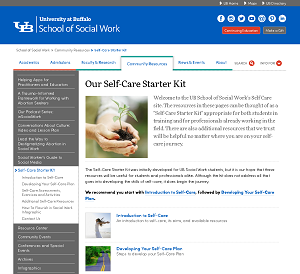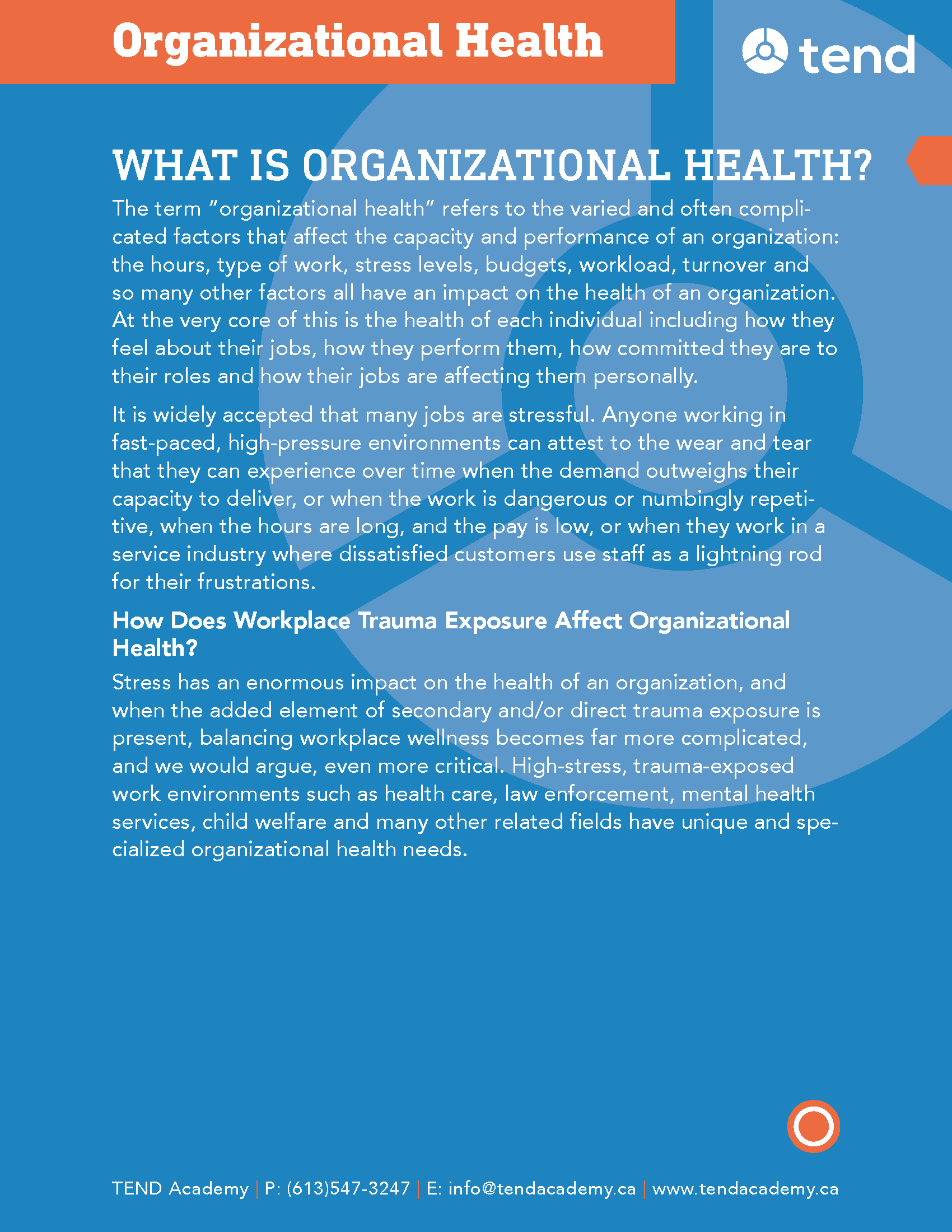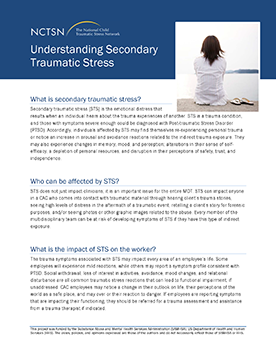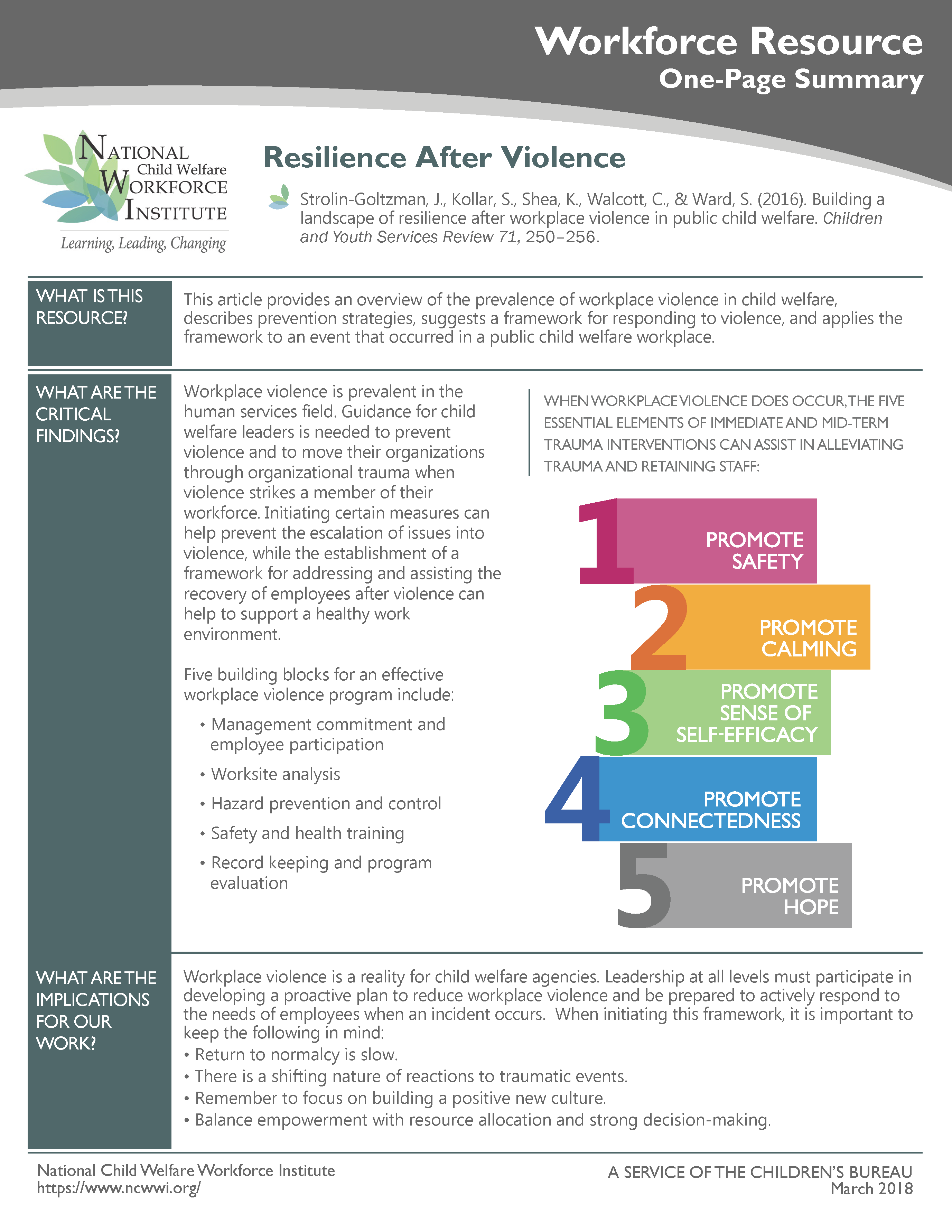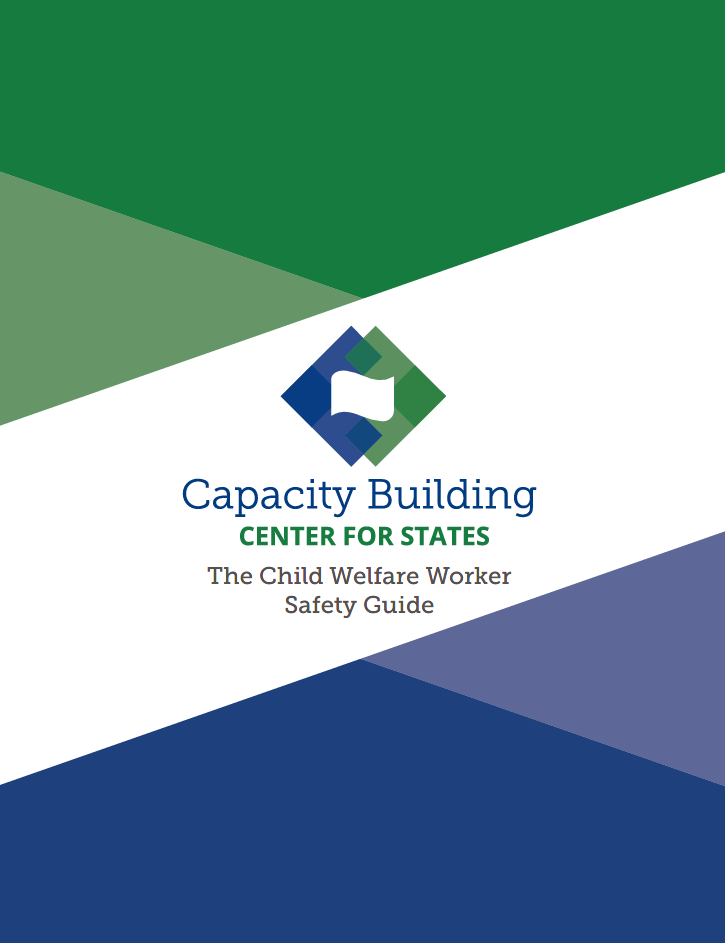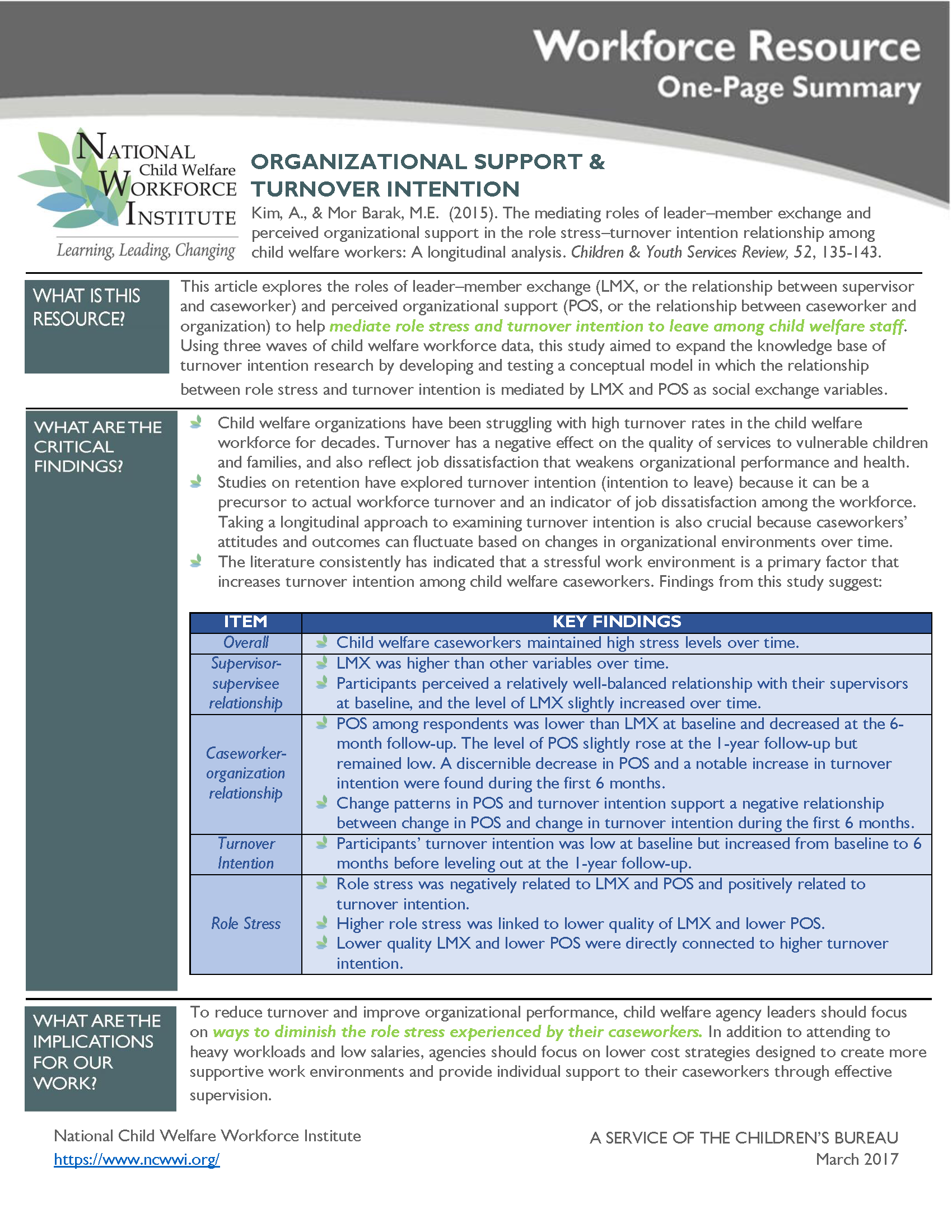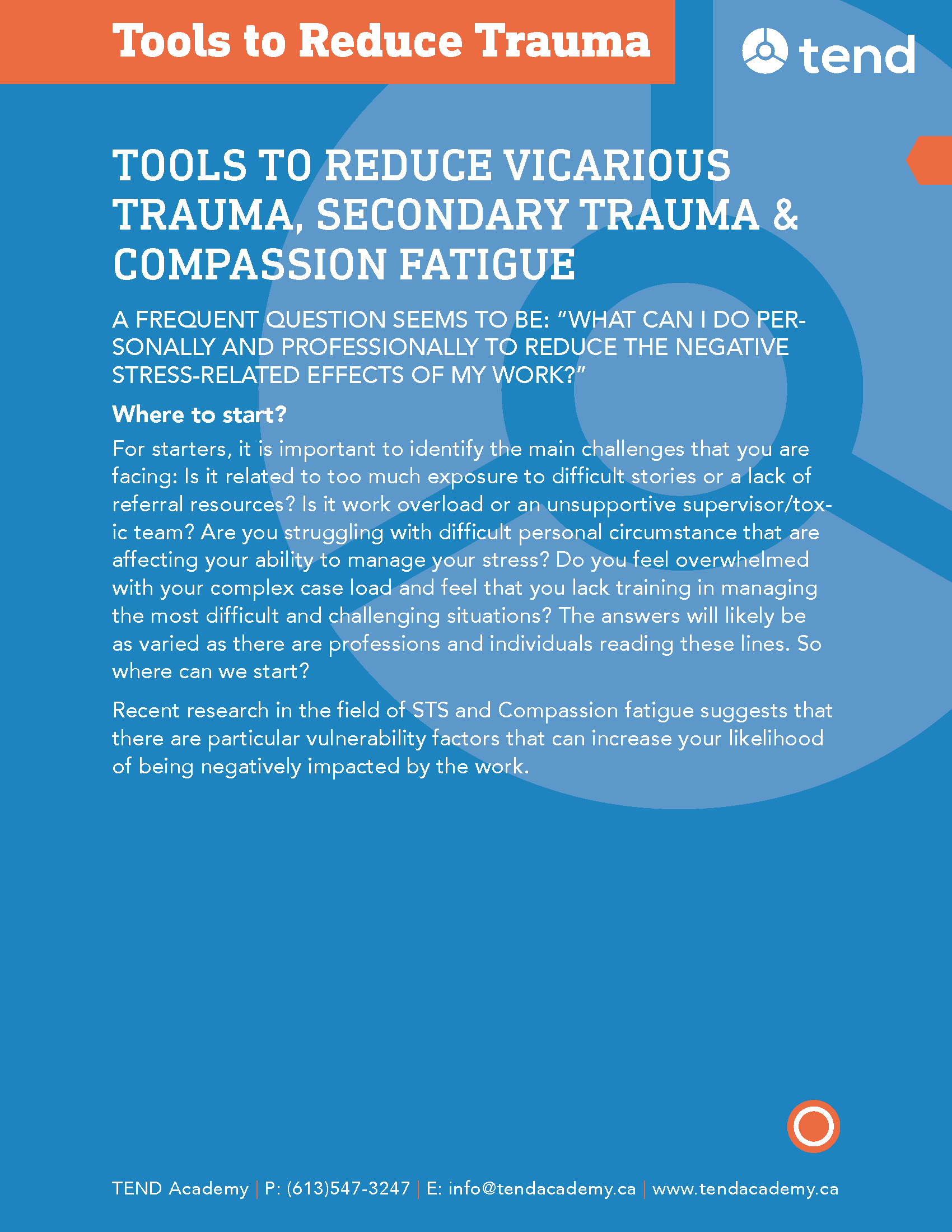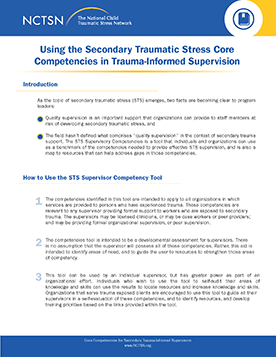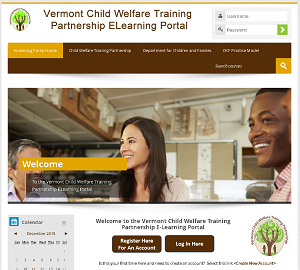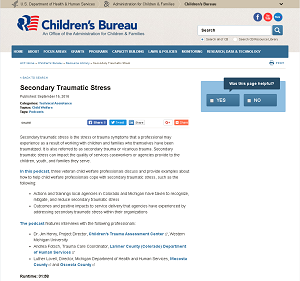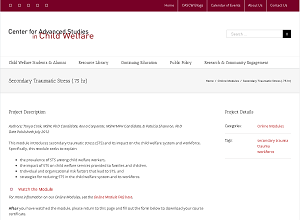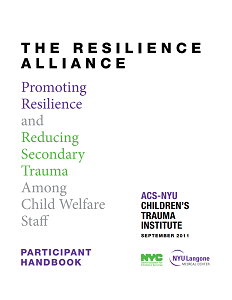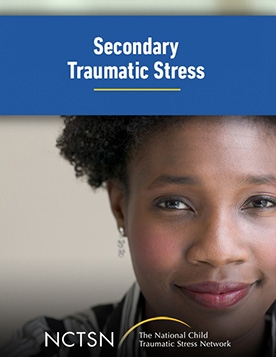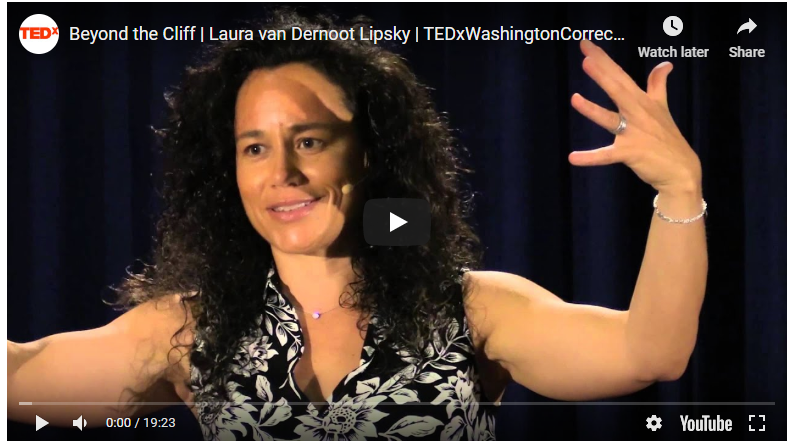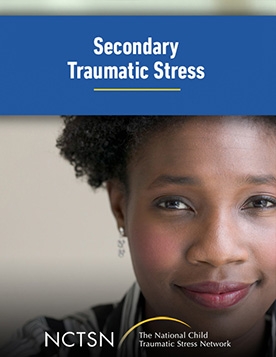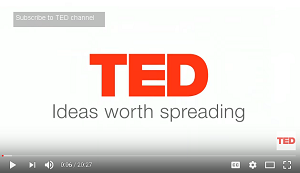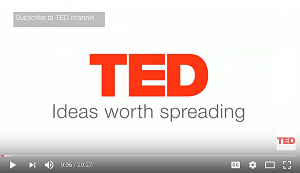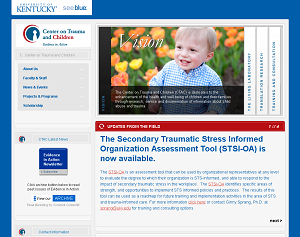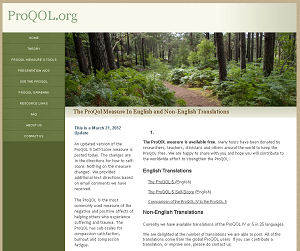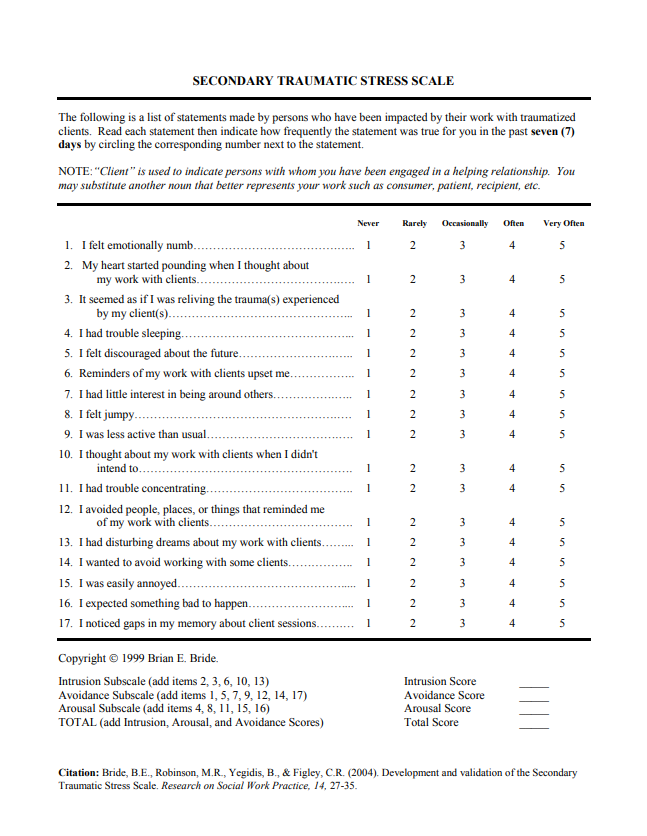-
CW 360 Secondary Trauma and the Child Welfare Workforce
Primary & Secondary Traumatic Stress
Center for Advanced Studies in Child Welfare, School of Social Work, University of MNChild WelfareThis publication includes articles that focus on practices and perspectives on the topic of secondary traumatic stress in the field of child welfare.
-
Addressing Secondary Traumatic Stress Among Child Welfare Staff- Child Welfare Practice Brief
Primary & Secondary Traumatic Stress
National Child Traumatic Stress Network (NCTSN)Child WelfareThis brief is intended for child welfare providers and stakeholders who are working on building trauma-informed practice into their agency. Some key points include responding to STS in staff, creating a smoother transition into foster care and recognizing parents who have experienced trauma.
-
Warning Signs: Vicarious Trauma, Secondary Traumatic Stress and Compassion Fatigue
Primary & Secondary Traumatic Stress
TEND AcademyGeneralThis document goes over physical, behavioral, and emotional warning signs of compassion fatigue and vicarious trauma and directs you to helpful resources and tools, including resources from the TEND Academy website.
-
Secondary Traumatic Stress: A fact sheet for Child-Serving Professionals
Primary & Secondary Traumatic Stress
National Child Traumatic Stress Network (NCTSN)GeneralThis fact sheet describes how individuals experience STS and discusses essential elements to address STS
-
What About You? A workbook for Those Who Work with Others
Primary & Secondary Traumatic Stress
National Center on Family HomelessnessGeneralThis workbook designed for use by individuals or teams to explore the impact of working in trauma exposed environments and tools to address the impacts of STS.
-
Self-Care Starter Kit
Primary & Secondary Traumatic Stress
University at Buffalo School of Social WorkGeneralThis website offers self-care resources for students and professionals engaged in the helping field to enhance well-being across domains of life.
-
What Is Organizational Health
Primary & Secondary Traumatic Stress
TEND AcademyGeneralThis brief PDF discusses how workplace trauma exposure affects organizational health and introduces strategies to help high stress, trauma-exposed organizations assess their functional capacity and develop a framework to understand organizational health.
-
Understanding Secondary Traumatic Stress for CAC Workers
Primary & Secondary Traumatic Stress
National Child Traumatic Stress Network (NCTSN)GeneralIn this fact sheet on the NCTSN Learning Center, tips are given to child advocacy center (CAC) workers on secondary traumatic stress, as well as details about who is impacted and how a CAC can respond to it.
-
Resilience After Violence
Primary & Secondary Traumatic Stress
National Child Welfare Workforce Institute (NCWWI)Child WelfareThis one-page summary provides an overview of the prevalence of workplace violence in child welfare, and introduces prevention strategies and a framework for responding to violence (Strolin-Goltzman, J., Kollar, S., Shea, K., Walcott, C., & Ward, S., 2016).
-
Child Welfare Worker Safety Guide
Primary & Secondary Traumatic Stress
Capacity Building Center for StatesChild WelfareGuidelines on ways to keep workers safe while doing effective work with clients and families.
-
Organizational Support & Turnover Intention
Primary & Secondary Traumatic Stress
National Child Welfare Workforce Institute (NCWWI)Child WelfareThis one-page summary outlines critical findings and implications from a study that examined leader-member exchange (the relationship between supervisors and caseworkers) and perceived organizational support in mediating turnover intention and role stress (Kim, A., & Mor Barak, M.E. (2015).
-
Tools To Reduce Vicarious Trauma, Secondary Trauma & Compassion Fatigue
Primary & Secondary Traumatic Stress
TEND AcademyGeneralThis document answers the question of what individuals can do personally and professionally to reduce the negative stress-related effects of work.
-
Tools To Reduce Vicarious Trauma, Secondary Trauma & Compassion Fatigue
Primary & Secondary Traumatic Stress
TEND AcademyGeneralThis document answers the question of what individuals can do personally and professionally to reduce the negative stress-related effects of work.
-
Using the Secondary Traumatic Stress Core Competencies in Trauma-Informed Supervision
Primary & Secondary Traumatic Stress
National Child Traumatic Stress Network (NCTSN)GeneralThis fact sheet is intended for supervisors to guide and develop their understanding of the core competencies of STS in order to provide better support to workers experiencing secondary trauma.
-
Tools To Reduce Vicarious Trauma, Secondary Trauma & Compassion Fatigue
Primary & Secondary Traumatic Stress
TEND AcademyGeneralThis document answers the question of what individuals can do personally and professionally to reduce the negative stress-related effects of work.
-
Using the Secondary Traumatic Stress Core Competencies in Trauma-Informed Supervision
Primary & Secondary Traumatic Stress
National Child Traumatic Stress Network (NCTSN)GeneralThis fact sheet is intended for supervisors to guide and develop their understanding of the core competencies of STS in order to provide better support to workers experiencing secondary trauma.
-
Secondary Traumatic Stress for child welfare and related professionals
Primary & Secondary Traumatic Stress
Vermont Child Welfare Training PartnershipChild WelfareThis free web-based training is part of the Foundations Certificate in Trauma-Informed Practice; participants can complete the STS Module only or can complete all modules.
-
Secondary Trauma in Child Welfare Children’s Bureau
Primary & Secondary Traumatic Stress
Children's BureauChild WelfareThis podcast interviews child welfare organizations on how they have addressed STS.
-
Secondary Traumatic Stress Module
Primary & Secondary Traumatic Stress
University of Minnesota’s Center for Advanced Studies in Child WelfareChild WelfareThis module introduces secondary traumatic stress and its impact on the child welfare system and workforce.
-
The Resilience Alliance: Promoting Resilience and Reducing Secondary Trauma among Child Welfare Staff
Primary & Secondary Traumatic Stress
Administration for Children’s Services- New York University Children’s Trauma InstituteChild WelfareThis curriculum is designed to help child welfare staff increase their resilience, optimism, self-care, social support and job satisfaction while decreasing stress reactivity, burnout and attrition.
-
Cultural Implications of Secondary Traumatic Stress
Primary & Secondary Traumatic Stress
National Child Traumatic Stress Network (NCTSN)Behavioral HealthThis webinar is offered through the NCTSN’s learning center. Presenters address the influence of culture on mental health providers coping with secondary traumatic stress (STS).
-
Compassion Fatigue 101
Primary & Secondary Traumatic Stress
TEND AcademyGeneralLed by Francoise Mathieu, this online course explores the essentials of compassion fatigue. The course is offered at a fee.
-
Trauma Stewardship: An Everyday Guide to Caring for Self While Caring for Others
Primary & Secondary Traumatic Stress
Ted TalkGeneralIn this Ted Talk Laura Van Dernoot discusses ways organizations and individuals may be impacted by trauma and suffering.
-
Organizational Secondary Traumatic Stress
Primary & Secondary Traumatic Stress
National Child Traumatic Stress Network (NCTSN)GeneralThis webinar is offered through the NCTSN’s learning center. Presenters address the impact of Secondary Traumatic Stress (STS) in organizational settings
-
The edge of compassion
Primary & Secondary Traumatic Stress
Ted TalkGeneralIn this Ted Talk, Francoise Mathieu explores ways to find balance in caring for others and oneself.
-
How the Worst Moments in Our Lives Make Us Who We Are
Primary & Secondary Traumatic Stress
Ted TalkGeneralIn this Ted Talk, Andrew Solomon discusses how we can find meaning from struggle.
-
Brené Brown on Vulnerability
Primary & Secondary Traumatic Stress
Ted TalkGeneralIn this Ted Talk, Brene Brown discusses the power of vulnerability, empathy, and belonging.
-
Secondary Traumatic Stress for child welfare and related professionals
Primary & Secondary Traumatic Stress
Vermont Child Welfare Training PartnershipChild WelfareThis free web-based training is part of the Foundations Certificate in Trauma-Informed Practice; participants can complete the STS Module only or can complete all modules.
-
Secondary Trauma in Child Welfare Children’s Bureau
Primary & Secondary Traumatic Stress
Children's BureauChild WelfareThis podcast interviews child welfare organizations on how they have addressed STS.
-
Secondary Traumatic Stress Module
Primary & Secondary Traumatic Stress
University of Minnesota’s Center for Advanced Studies in Child WelfareChild WelfareThis module introduces secondary traumatic stress and its impact on the child welfare system and workforce.
-
The Resilience Alliance: Promoting Resilience and Reducing Secondary Trauma among Child Welfare Staff
Primary & Secondary Traumatic Stress
Administration for Children’s Services- New York University Children’s Trauma InstituteChild WelfareThis curriculum is designed to help child welfare staff increase their resilience, optimism, self-care, social support and job satisfaction while decreasing stress reactivity, burnout and attrition.
-
Cultural Implications of Secondary Traumatic Stress
Primary & Secondary Traumatic Stress
National Child Traumatic Stress Network (NCTSN)Behavioral HealthThis webinar is offered through the NCTSN’s learning center. Presenters address the influence of culture on mental health providers coping with secondary traumatic stress (STS).
-
Compassion Fatigue 101
Primary & Secondary Traumatic Stress
TEND AcademyGeneralLed by Francoise Mathieu, this online course explores the essentials of compassion fatigue. The course is offered at a fee.
-
Trauma Stewardship: An Everyday Guide to Caring for Self While Caring for Others
Primary & Secondary Traumatic Stress
Ted TalkGeneralIn this Ted Talk Laura Van Dernoot discusses ways organizations and individuals may be impacted by trauma and suffering.
-
Organizational Secondary Traumatic Stress
Primary & Secondary Traumatic Stress
National Child Traumatic Stress Network (NCTSN)GeneralThis webinar is offered through the NCTSN’s learning center. Presenters address the impact of Secondary Traumatic Stress (STS) in organizational settings
-
The edge of compassion
Primary & Secondary Traumatic Stress
Ted TalkGeneralIn this Ted Talk, Francoise Mathieu explores ways to find balance in caring for others and oneself.
-
How the Worst Moments in Our Lives Make Us Who We Are
Primary & Secondary Traumatic Stress
Ted TalkGeneralIn this Ted Talk, Andrew Solomon discusses how we can find meaning from struggle.
-
Brené Brown on Vulnerability
Primary & Secondary Traumatic Stress
Ted TalkGeneralIn this Ted Talk, Brene Brown discusses the power of vulnerability, empathy, and belonging.
-
Secondary Traumatic Stress Informed Organizational Assessment (STSI-OA) Tool
Primary & Secondary Traumatic Stress
Center on Trauma and ChildrenGeneralThe STSI-OA is an assessment tool that can be used by organizations to evaluate the degree to which their organization is STS-informed and able to respond to the impact of STS in the workplace.
-
Professional Quality of Life Elements Theory and Measurement (ProQOL)
Primary & Secondary Traumatic Stress
The Center for Victims of TortureGeneralThis assessment tool aide’s professionals in measuring the negative and positive effects from helping those who have experienced trauma.
-
Secondary Traumatic Stress Scale (STSS)
Primary & Secondary Traumatic Stress
Dr. Brian BrideGeneralThe STSS is a 17-item self-report measure of secondary trauma
